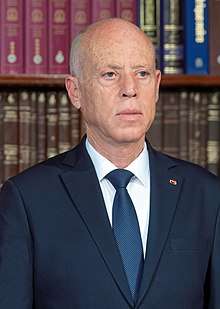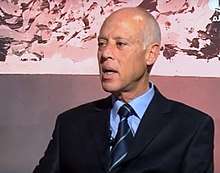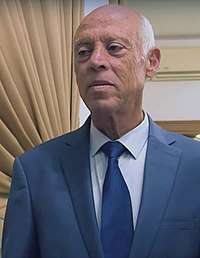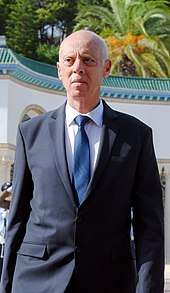Kais Saied
Kais Saied (Arabic: قَيس سَعِيد; born 22 February 1958) is a Tunisian politician, statesman, jurist and former lecturer serving as the fifth President of Tunisia since October 2019. He was president of the Tunisian Association of Constitutional Law from 1995 to 2019. An independent candidate in the 2019 presidential election, he was elected against Nabil Karoui in the second round.
His Excellency Kais Saied قيس سعيد | |
|---|---|
 Saied in 2019 | |
| 7th President of Tunisia | |
| Assumed office 23 October 2019 | |
| Prime Minister | Youssef Chahed Elyes Fakhfakh[1] Hichem Mechichi (designated) |
| Preceded by | Beji Caid Essebsi Mohamed Ennaceur (acting) |
| Personal details | |
| Born | 22 February 1958 Tunis, Tunisia[2] |
| Nationality | Tunisian |
| Political party | Independent |
| Spouse(s) | Ichraf Chebil |
| Children | 3 |
| Alma mater | University of Tunis International Institute of Humanitarian Law |
| Profession | Jurist, lecturer |
Early life
Kais Saied is the son of Moncef Saied and Zakia Bellagha from Béni Khiar (Cap Bon). According to Saied, his late father protected the young Gisèle Halimi from the Nazis.[3] His mother, although educated, is a housewife.[4] His family is of rather modest origin, but intellectual and member of the middle class. His paternal uncle, Hicham Saïed, is the first pediatric surgeon in Tunisia, known worldwide for having separated conjoined twins in the 1970s.[5] Kaïs Saïed completed his secondary studies at Sadiki College.[4]
Professional career

A jurist by formation, he is a specialist in constitutional law, and secretary-general of the Tunisian Association of Constitutional Law between 1990 and 1995 then vice-president of the association since 1995.
Director of the public law department at the University of Sousse between 1994 and 1999, then at the Faculty of Juridical, Political and Social Sciences of Tunis of the University of Carthage from 1999 to 2018, he was a member of the group of experts of the General Secretariat of the Arab League between 1989 and 1990, expert at the Arab Institute for Human Rights from 1993 to 1995 and member of the committee of experts responsible for revising the draft Tunisian Constitution in 2014[6] . He was also a member of the scientific council of several commissions academics.
While a visiting professor at several Arab universities, in 2013 he refused to be part of the commission of experts whose mission was to find a legal solution to the problem of the Independent High Authority for Elections. He retired in 2018.[7]
Political career
Political ascent
From 2013–2014 Kais Saied participated in several political clubs and meetings, which bring together young people.
In 2016 the Mouassissoun movement was created to support Saied's action and projects.
According to Olfa Lamloum, director of the Tunis office of the NGO International Alert, "[Saïed] succeeded in gaining the confidence of these young people in the districts and regions of the interior, not by promises but by bringing responses to the failure of representative democracy". For sociologist Mohamed Jouili, "in recent years he has been able to establish a strong relationship of trust with young people by meeting them all over the country, which has enabled him to build around him a belt of young people who have led his campaign".
2019 presidential campaign

Saied was one of the first declared candidates in the 2019 Tunisian presidential election.[8] Running as an Independent social conservative, he has sought to appeal to younger voters.[9] One of his policies included support for allowing citizens to recall their elected officials.[10][11] Saied suggested to voters that many of Tunisia's current issues were due to "non-respect for many constitutional laws".[9] He presented a plan to combat corruption, whether it is "moral or financial".[9] Saied was supported by both Islamists and leftists.[12]
In a June 2019 interview with the newspaper Acharaâ Al Magharibi, Saied announced his support for the death penalty. He also made statements that homosexuality, or rather its public expression, is financed and encouraged by foreign countries, telling the paper:
I was told certain houses were rented by foreign parties... homosexuality has existed throughout history, but certain people want to spread homosexuality.[13]
He has taken conservative positions on women's issues as well, coming out against gender equality in inheritance issues, in accordance with the interpretation of religious law.[14]
Kais Saied is against normalisation of relations with Israel, saying that Israel is at war with the Muslim world and any Muslim leader who normalizes his or her country's relationship with the Zionists should be tried for treason. He said his country has no problem with Jews and that Tunisians including his father protected Jews during the Second World War.[15][16]
Saied has also stated that he is in favor of a decentralised, three-tier, indirect manner of electing national legislative representatives, some elements of direct democracy, and believes that local representatives should be elected based on character and its underlying structure rather than political ideology. Due to his relative obscurity and lack of campaigning, several of his positions were not well-defined aside from his social conservatism.[12] Despite being supported by Ennahdha in the election and holding socially conservative positions, Saied did not describe himself as an Islamist, and had advisers from across the political spectrum.[17] He also is not in favor of adding religious elements to the constitution, stating that these were only his personal beliefs.
Several media sources[9][14][18] referred to Saied as "RoboCop", given his monotonous voice, his use of Standard Arabic rather than Tunisian dialect, and his focus on law and order issues. On the campaign trail, Saied portrayed himself as a man of the people, somewhat similarly to Nabil Karoui, another populist candidate.
Saied received 620,711 votes in the first round of the 2019 Tunisian presidential election, coming in first place, and moved on to face Karoui in the second round. He was announced on 14 October as the new President of Tunisia, winning the second round with 72.71% of the vote.[12] He took office nine days later, becoming only the second president who was not an heir to the legacy of the country's founding president, Habib Bourguiba.
The prime minister then had two months to create a coalition.[12]
President of Tunisia
Saied was sworn in as Tunisia's president on 23 October 2019.[19][20] He is the first president born after the country gained independence from France in 1956.
Transition and investiture

The results of the presidential election were proclaimed identically by the Independent High Authority for Elections on 17 October. On the same day, Kaïs Saïed chose his brother Naoufel, also a professor of constitutional law, to appoint the advisers and members of the presidential cabinet. The office of the Assembly of the Representatives of the People met on 18 October and fixed the oath on 23 October. This date corresponds to the maximum duration of the presidential interim of 90 days.
On October 23, at the Presidential Palace of Carthage, after taking his oath before the outgoing Assembly, during which he promises to fight against terrorism and its causes, as well as to guarantee the gains of Tunisian women, while strengthening his economic and social rights, he sees the interim president, Mohamed Ennaceur, transferring presidential powers to him.
First steps
From a practical point of view, he refused to stay at the presidential palace of Carthage, preferring his villa in Mnihla, located in the governorate of Ariana.
On October 30, he appointed diplomat Tarek Bettaïeb as head of the presidential cabinet, General Mohamed Salah Hamdi as national security adviser, while Tarek Hannachi heads the protocol. Abderraouf Bettaïeb is Minister-Advisor to the President of the Republic, Rachida Ennaifer in charge of communication, while Nadia Akacha is responsible for legal affairs.
Government formation
The regime being semi-presidential, Kais Saied had a week after his inauguration to instruct the party which took the lead in the legislative elections to form a government. The latter then has a month to obtain the confidence of the Assembly of People's Representatives. On 15 November 2019, he appointed Habib Jemli, the candidate for Ennahdha, to the post of head of government and charged him with forming a cabinet. On 10 January 2020, the Assembly rejected the composition of the government, which was also subject to delays when it was announced. Saied therefore had ten days to appoint a new head of government. On 20 January 2020, he appointed Elyes Fakhfakh.
His government was announced on 15 February, but Ennahdha, whose ministers were announced there, announced that he would not vote for confidence because of the non-participation of Heart of Tunisia. A slightly modified version of the government, but without the participation of Heart of Tunisia, was announced on 19 February; Ennahdha, fearing a dissolution, voted to accept the government. On 27 February, the Assembly of People's Representatives granted confidence to the government.
In June 2020, according to Al Jazeera, "an independent member of Parliament published documents indicating that Fakhfakh owned shares in companies that won deals worth 44 million dinars". Fakhfakh denied any wrongdoing. On 15 July 2020, he resigned.[21] On July 25, 2020, Saïed appointed Hichem Mechichi head of government, with the task of forming a government in one month and obtaining the confidence of the Assembly of the Representatives of the People.[22][23]
Personal life
Kais Saied is married to the judge Ichraf Chebil, whom he met when she was a law student in Sousse. He is the father of three children (two daughters and a son: Sarah, Mouna and Amrou).[24]
Honours
Tunisian national
He is Grand Master of Tunisians Honorary Orders in his quality of president of the Tunisian Republic.
- Collar of the Order of Independence (automatic upon taking presidential office)
- Grand Cordon of the Order of the Republic (automatic upon taking presidential office)
- Grand Cordon of the National Order of Merit of Tunisia (automatic upon taking presidential office)
Foreign Honors

Publications
Saied is the author of a number of works on constitutional law, including:
- (in Arabic) Tunisian Political Texts and Documents (نصوص ووثائق سياسية تونسية) [with Abdelfattah Amor], published by the Center of Administrative, Political, and Social Studies and Research, Tunis, 1987
- (in French) General Provisions of the Constitution (Dispositions générales de la constitution) [direction], pub. Faculty of Juridical, Political, and Social Sciences of Tunis, Tunis, 2010
Miscellaneous
After assuming the presidency, Kais Saied garnered significant media attention for his handwritten official letters in fine Maghrebi script.[26][27]
Notes and references
- "Tunisia's Saied tasks former finance minister to form new gov't". Al Jazeera. Retrieved 27 January 2020.
- "قيس سعيد من هو.. ولماذا اختارته تونس؟". سكاي نيوز عربية (in Arabic). Retrieved 16 October 2019.
- Vaillant, Gaël. "En Tunisie, le conservateur Kais Saied, élu président, va mettre en place sa "révolution légale"". Le Journal du Dimanche (in French). Retrieved 12 August 2020.
- ""Robocop", "M. Propre"... qui est Kaïs Saïed, le nouveau président tunisien ?". Le Dauphiné libéré (in French). Retrieved 12 August 2020.
- "Qui est Kais Saied, l'infatigable marcheur, qui a emporté le premier tour de la présidentielle en Tunisie (Album photos)". Leaders (in French). Retrieved 17 September 2019.
- "Kaïs Saïed". arabesque.tn (in Arabic). 29 November 2013. Retrieved 9 May 2017.
- "Présidentielle en Tunisie : qui est Kais Saied, le nouveau président élu". tv5monde.com (in French). 14 October 2019. Retrieved 14 October 2019.
- "Kais Saïd, candidat à la présidentielle de 2019". webmanagercenter.com (in French). 3 December 2018. Retrieved 24 June 2019.
- Delmas, Benoit. "Tunisie : Kaïs Saïed, un Robespierre en campagne". Le Point. Retrieved 17 September 2019.
- Frida Dahmani (26 October 2018). "Présidentielle en Tunisie – Kaïs Saïed : "Je ne serai candidat d'aucun parti"". jeuneafrique.com (in French). Retrieved 24 June 2019.
- "Kaïs Saïed : "Je me présenterai aux présidentielles en tant qu'indépendant"". webdo.tn (in French). 23 March 2019. Retrieved 24 June 2019.
- Amara, Tarek; Argoubi, Mohammed (14 October 2019). "Hailing 'new revolution', political outsider Saied elected Tunisia's president". Reuters. Retrieved 20 October 2019.
- "Kaïs Saïed : j'éliminerai les élections législatives et je suis pour la peine de mort". businessnews.com.tn (in French). 11 June 2019. Retrieved 12 June 2019.
- Lussato, Céline. "Présidentielle tunisienne : " Robocop ", ultraconservateur… 10 choses à savoir sur Kaïs Saïed". Le Nouvel Observateur. Retrieved 17 September 2019.
- "Tunisia's president-elect: Normalization with Israel is treason". Israel National News. Retrieved 16 October 2019.
- staff, T. O. I.; AFP. "Tunisia's new president regards any ties with Israel as 'high treason'". www.timesofisrael.com. Retrieved 16 October 2019.
- Saleh, Heba (13 October 2019). "Outsider 'Robocop' wins landslide victory in Tunisia poll". Financial Times. Retrieved 16 October 2019.
- "Tunisia elections: 'Robocop' and 'Berlusconi' head to second round". Middle East Eye. Retrieved 17 September 2019.
- "Tunisia's new president sworn in, vows to fight corruption". Associated Press. 23 October 2019. Retrieved 23 October 2019.
- Amara, Tarek (23 October 2019). "Political outsider Saied sworn in as Tunisia's president". Reuters. Retrieved 23 October 2019.
- "Tunisia risks fresh political deadlock as PM Fakhfakh resigns". Al Jazeera. 16 July 2020. Retrieved 17 July 2020.
- "Tunisie : le ministre de l'Intérieur Hichem Mechichi désigné chef du gouvernement". france24.com (in French). 25 July 2020. Retrieved 26 July 2020.
- "Kais Saïed charge Hichem Mechichi de former le futur gouvernement". mosaiquefm.net (in French). 25 July 2020. Retrieved 25 July 2020.
- "Présidentielle 2019 : Biographie de Kais Saied, vainqueur du premier tour". Webdo (in French). 16 September 2019. Retrieved 17 September 2019.
- "'L'Algérie décerne la médaille de l'ordre du mérite national à Kais Saied'".
- "كتبها بخط يده.. رسالة سعيّد للجملي تثير مواقع التواصل (شاهد)". عربي21 (in Arabic). 16 November 2019. Retrieved 3 January 2020.
- نت, العربية (16 November 2019). "بالصورة.. رسالة من الرئيس التونسي تشعل مواقع التواصل". العربية نت (in Arabic). Retrieved 3 January 2020.
External links
- Camille Lafrance (19 April 2019). "Présidentielle en Tunisie : dix choses à savoir sur Kaïs Saïed, deuxième dans les sondages". jeuneafrique.com (in French). Retrieved 24 June 2019.

| Political offices | ||
|---|---|---|
| Preceded by Mohamed Ennaceur Acting |
President of Tunisia 2019–present |
Incumbent |
